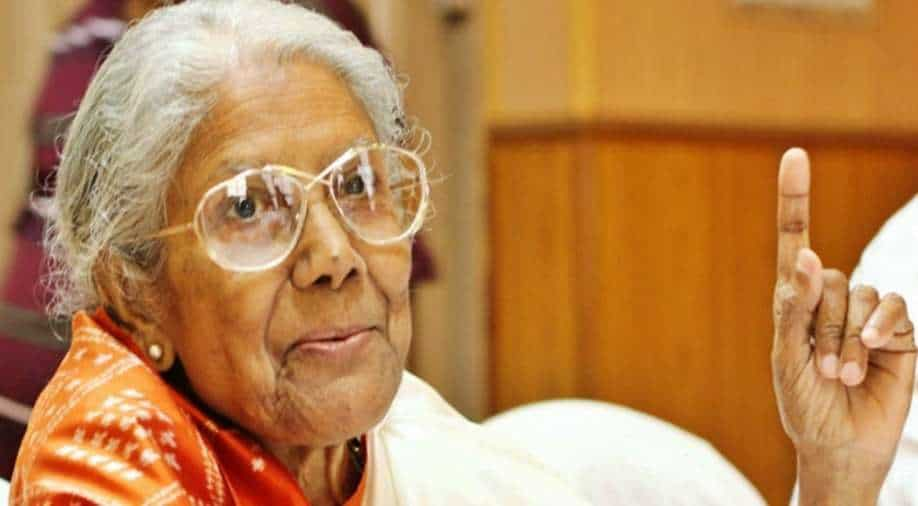Kolkata: Legendary Bengali semi-classical singer Sandhya Mukherjee, breathed her last Tuesday evening following a massive cardiac arrest. She was 91 and leaves behind daughter Jhinuk and her son-in law. Sandhya Mukherjee had worked with leading music directors such as SD Burman, Naushad and Salil Chaudhury. Her death had millions of mourning fans of all ages. She breathed her last at around 7.30pm a hospital official said.
Mukherjee had been in the hospital since January 27 due to ill health including Covid-19. She was was put on vasopressor support and shifted to the Intensive Care Unit (ICU) earlier in the day following a drop in her blood pressure, hospital sources said.
“She (Mukherjee) suffered a massive heart attack at around 7.30pm PM following which she expired. Because of irregular heartbeat she could not be revived,” the senior hospital official informed.
West Bengal Chief Minister, Mamata Banerjee, who had a close relationship with the singer, mourned her death. Banerjee said she would curtail a three-day tour to the northern districts of West Bengal and would return to the city to attend Mukherjee’s last rites.
“Sandhyadi’s last rites will be conducted with full state honours which include a gun salute. Her body will be kept at the `peace heaven’ (mortuary) tonight (Tuesday) and I am trying to be back in the city by tomorrow (Wednesday) after which the last rites will be conducted,” Banerjee said.
Virtually every Bengali language television and radio station in both India and Bangladesh started playing her songs and clips of movie where she has sung as news of her death spread.
Born in 1931 in Kolkata, Mukherjee’s death comes just days after the demise of Lata Mangeshkar earlier this month. Incidentally both were good friends having been introduced by SD Burman.
Mukherjee was rushed to the state-run SSKM hospital January 27, a day after he had a fall in the bathroom at her south Kolkata residence. The singer had tested positive for Covid-19 and suffered multi-organ dysfunction and fracture in the neck of femur (left side) due to the fall, for which she was being treated.
The singer, a recipient of `Banga Bibhushan’, and National Film Award for ‘Best Female Playback Singer’ had refused an offer of Padma Shri award when she was contacted by central government officials telephonically for her consent before Republic Day this year.
Condoling Mukherjee’s death, Hindustani classical maestro Pandit Ajoy Chakraborty said, “It was a personal loss for me. She was a mother figure for all of us. I still can’t believe she is no more.”
Singer Usha Uthup said the love, affection and support she had received from her would be some of the most cherished moments of her life. “She (Mukherjee) was such a motherly figure to all of us. The kind of affection I received from her would be the most cherished moments of my life,” Uthup said.
In the late 1940s, Mukherjee started learning music from Santosh Kumar Basu, AT Kannan and Chinmoy Lahiri. However, she began her formal training under Patiala Gharana under legendary Ustad Bade Ghulam Ali Khan. Under his tutelage, she mastered the art of Indian classical music.
Mukherjee began her career as a playback singer in the early 1950s, but returned to Kolkata in the late 1950s due to personal reasons.
Cutting across borders, for millions of Bengalis across the globe, Mukherjee had become the musical voice of an era of romance, where Uttam Kumar and Suchitra Sen ruled the matinee lights.
Mukherjee played a role in the Bangladesh liberation war joining many leading artists who performed free concerts to raise money for the 10 million East Pakistan citizens who were forced to seek refuge in India. She also sang for the ‘Swadhin Bangla Betar Kendra’ (Free Bangladesh Radio) in Kolkata, set up by the Government of Bangladesh in exile.
When Sheikh Mujibur Rahman, the founding father of Bangladesh, returned to Bangladesh in 1972, he was greeted by a song sung by Mukherjee which was played on ‘Swadhin Bangla Betar’.
